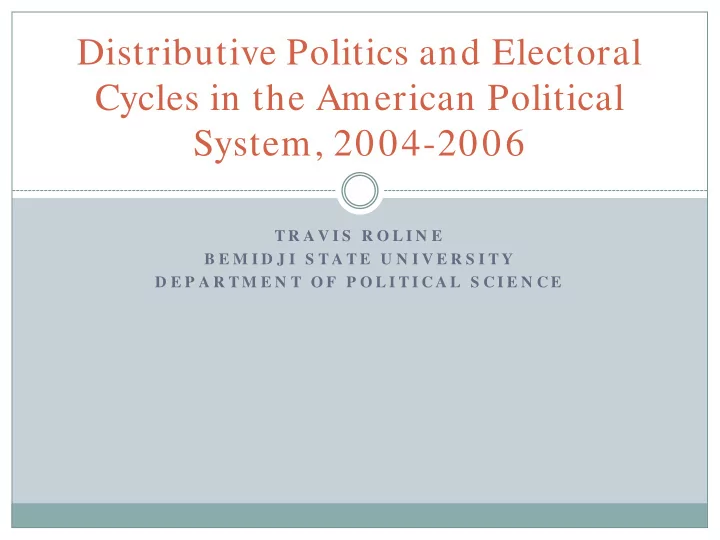

Distributive Politics and Electoral Cycles in the American Political System, 2004-2006 T R A V I S R O L I N E B E M I D J I S T A T E U N I V E R S I T Y D E P A R T M E N T O F P O L I T I C A L S C I E N C E
Presentation Overview Overview of Distributive Politics and Definition Previous Research/ Studies on the Subject Research Question, Data, and Methodology 2004 Battleground & Non-Battleground States Map Bar Charts Linear Regression Conclusions and Thoughts for Modification/ Improvement
Distributive Politics Definition: Policy of determining who gets what, when, and how much Grants: Project Formula Block
Previous Research Historical Basis: Wallis, J. J. 1987. Politics and Economic Recovery During the Great Depression. Review of Econom ics and Statistics Vol. 69, No.3 (August) , 516- 520. Impact of the President: Shor, B. 2003. Presidential Power and Distributive Politics: Federal Expenditures in the 50 States, 1983-2001. Midw est Political Science Association (pp. 1-41). Chicago: University of Chicago Press. Congressional Appropriations: Kiewiet, D. R., & McCubbins, M. D. 1985. Congressional Appropriations and the Electoral Connection. Am erican Journal of Political Science 47 (February) , 59-82.
Data & Methodology Data: Grants (Project, Block, and Formula) US House of Representatives and US Senate (political party, delegation, and control) John Kerry’s Vote Percentage (2004) State populations, percentage of Black and Latino residents in a particular state, median household income, and educational attainment Methodology: Map Bar Charts & Regression Analysis via SPSS
2004 Presidential Election Battle and Non- Battleground States
Mean Block Grants and US House Republican Delegation 2004-2006
Mean Block Grants and US Senate Republican Delegation 2004-2006
Mean Formula Grants and US House Republican Delegation 2004-2006
Mean Formula Grants and US Senate Republican Delegation 2004-2006
Mean Project Grants and US House Republican Delegation 2004-2006
Mean Project Grants and US Senate Republican Delegation 2004-2006
Linear Regression with Project Grants as Dependent Variable R=.227 R-Squared=.052 Adjusted R-Squared=.037 Model B Standard Beta T Sig. Error Constant 59.135 30.453 1.942 .053 % Pop. -2.62 2.433 -.068 -1.079 .281 w/ bachelor deg. Median Incom e 2.842 .001 .179 2.837 .005 % Republican -27.883 10.863 -.117 -2.567 .011 Control (House) % Latino -.768 .426 -.075 -1.804 .072 % Black .310 .493 .029 .629 .529 Battleground -31.045 9.292 -.143 -3.341 .001 Senate 5.959 8.836 .029 .674 .500 Delegation
Conclusions So… does distributive politics actually exist? Modifications to be made…
Recommend
More recommend